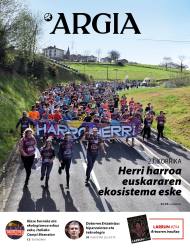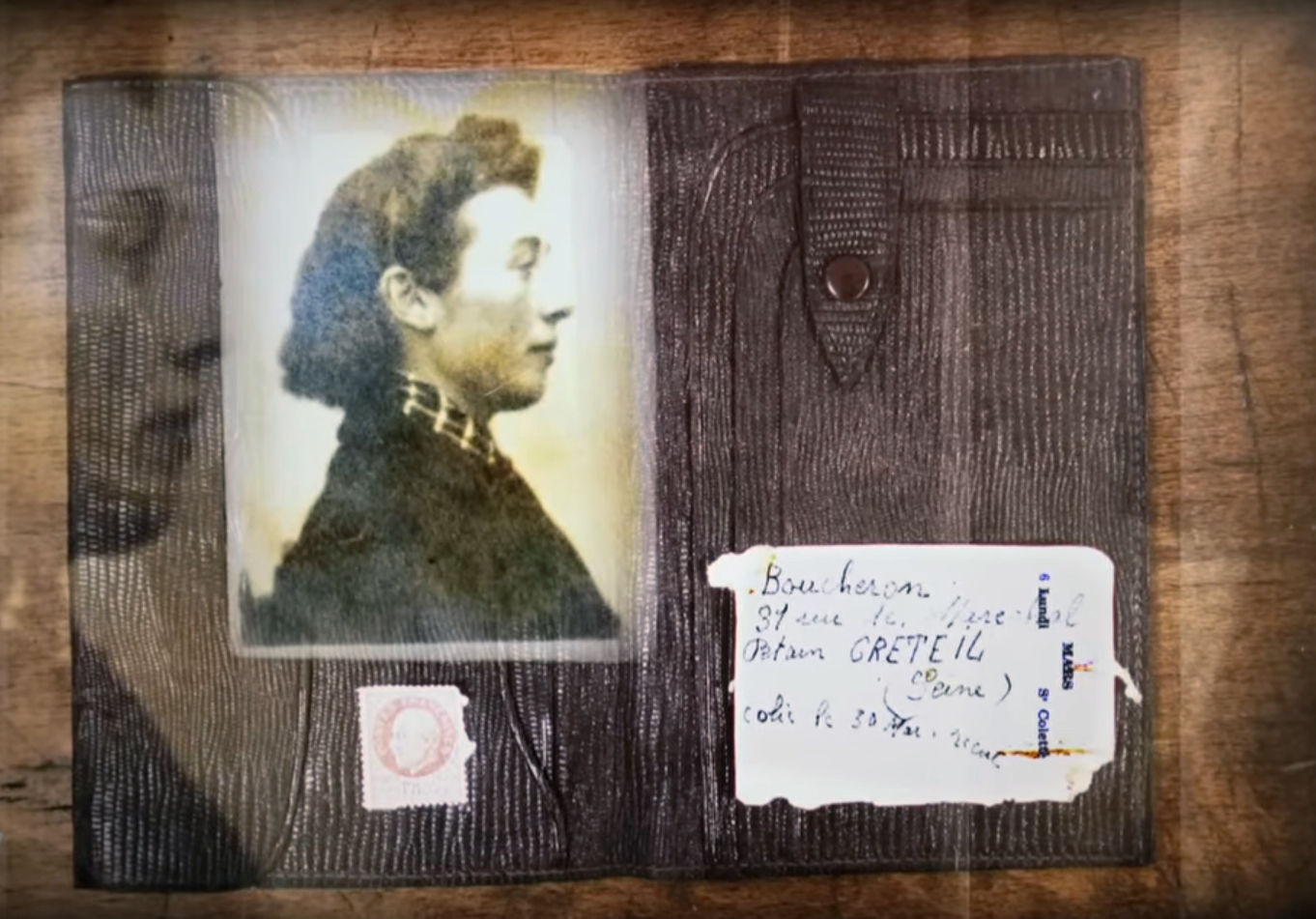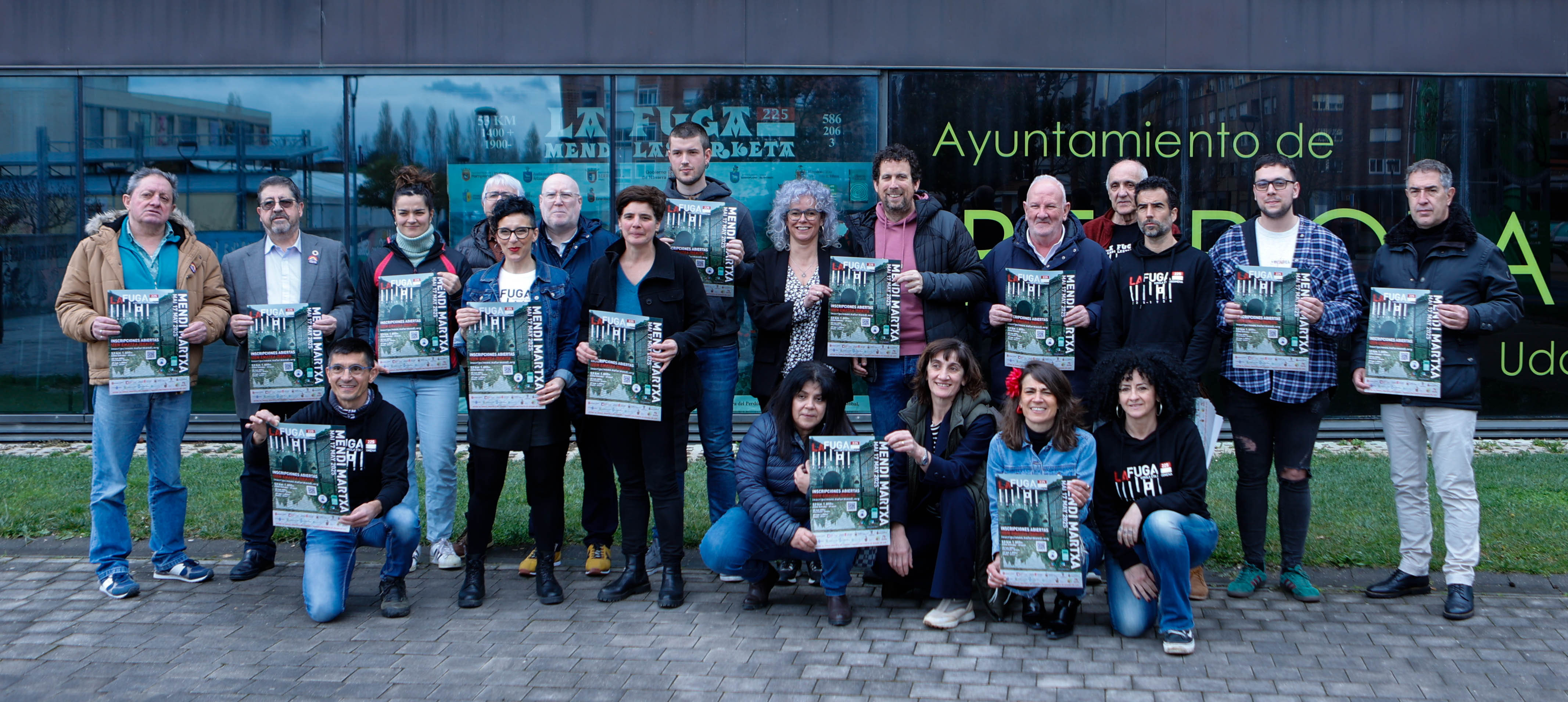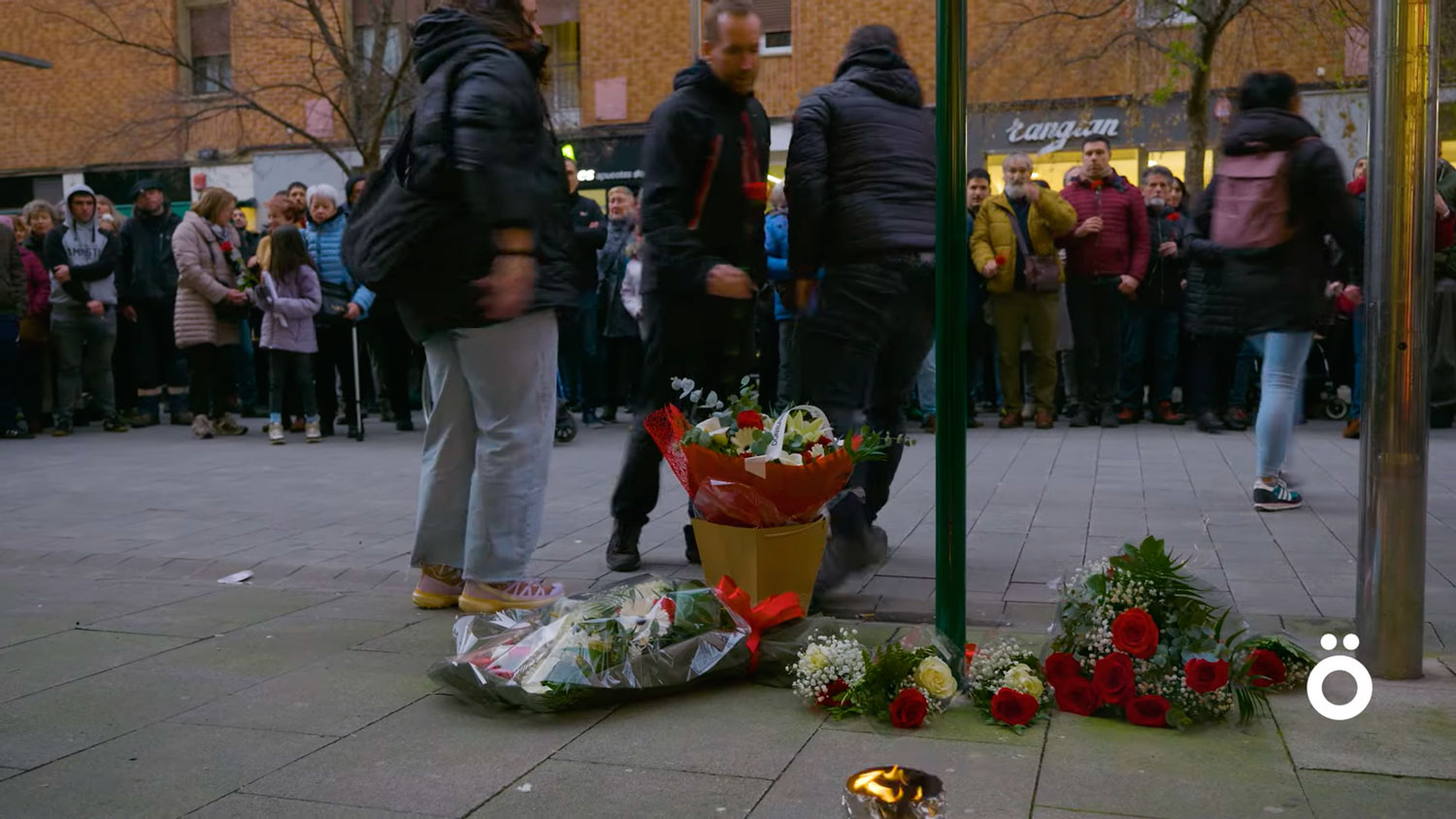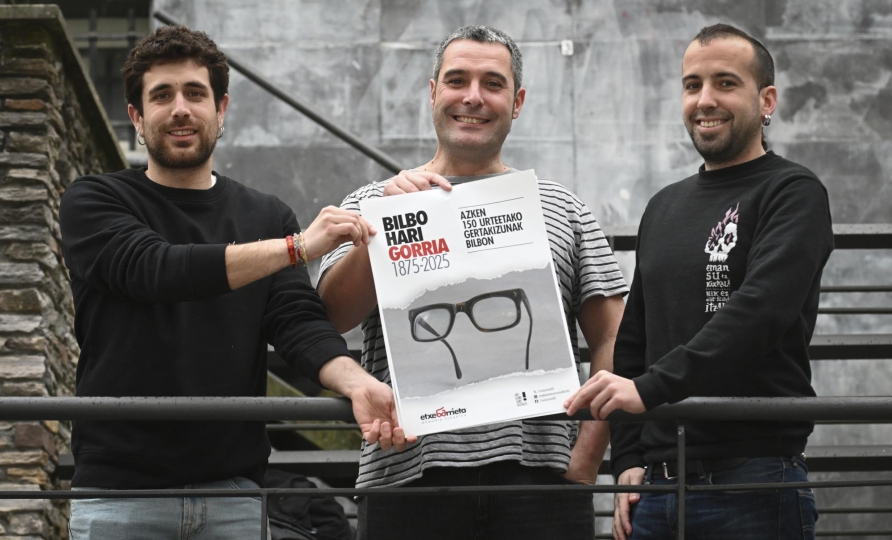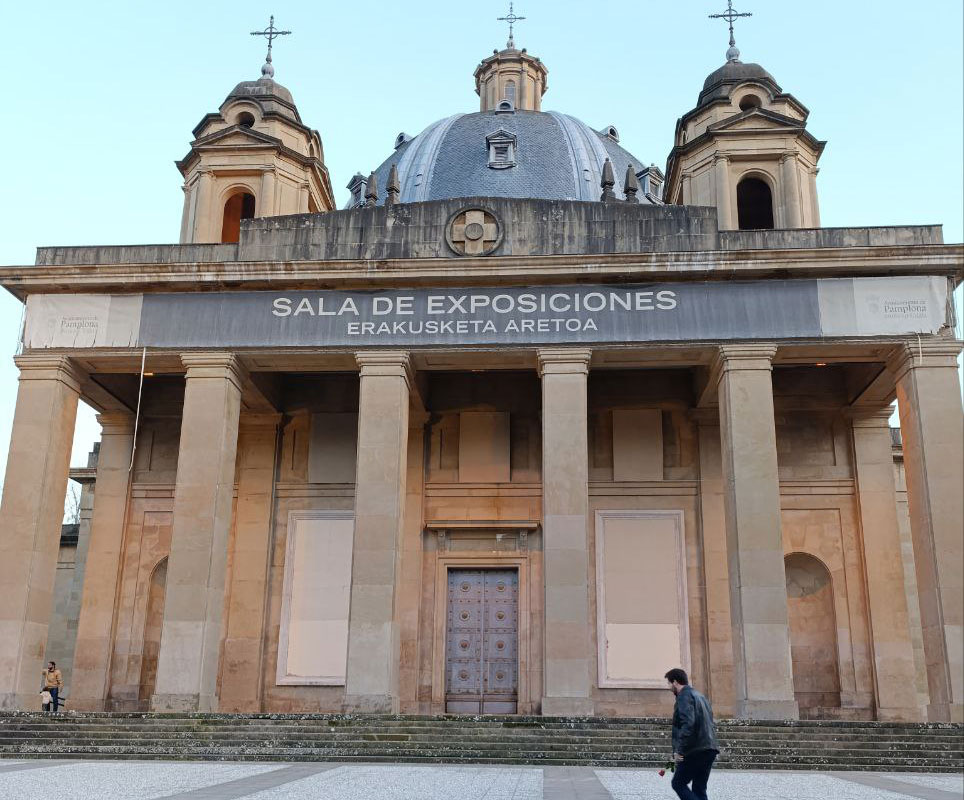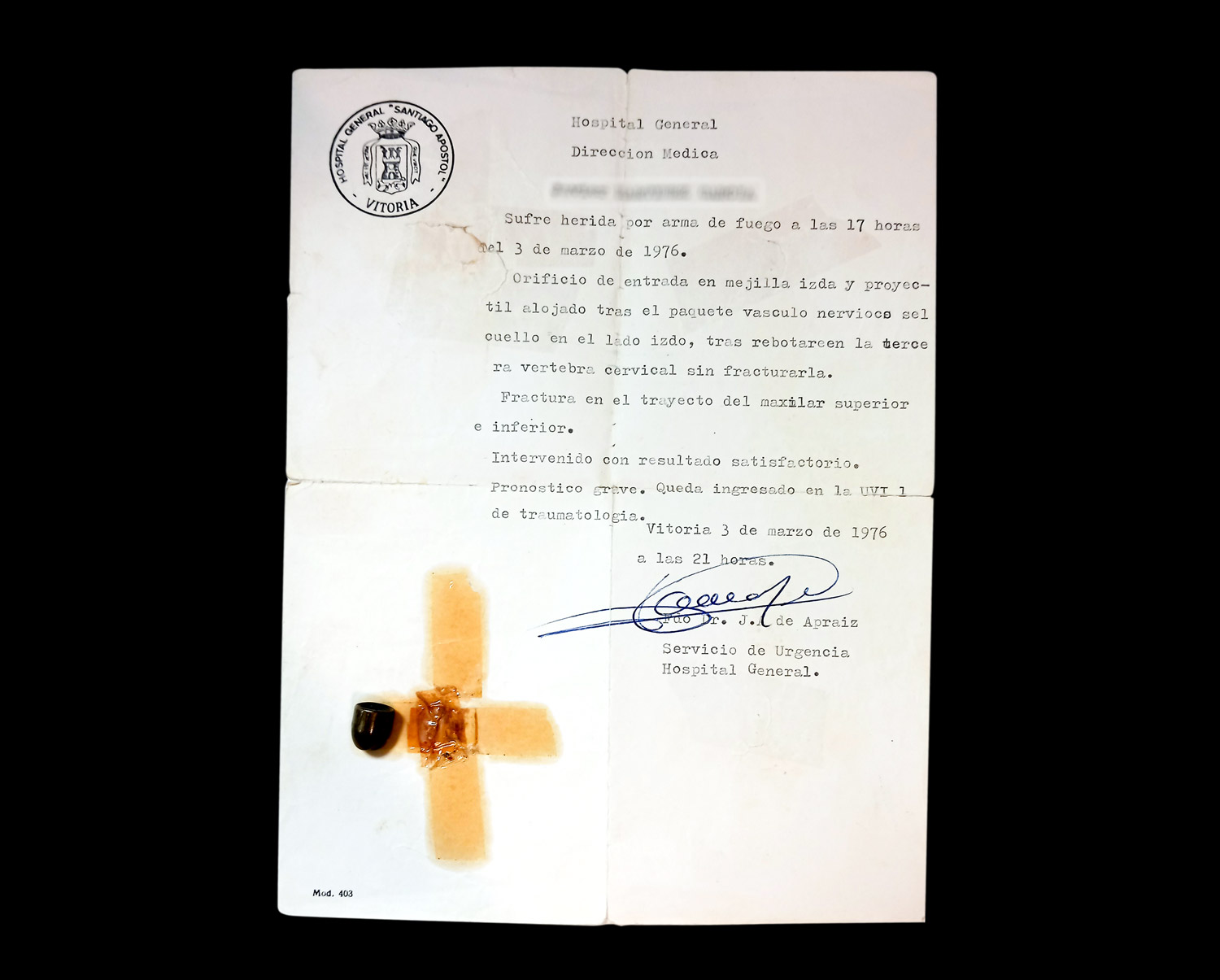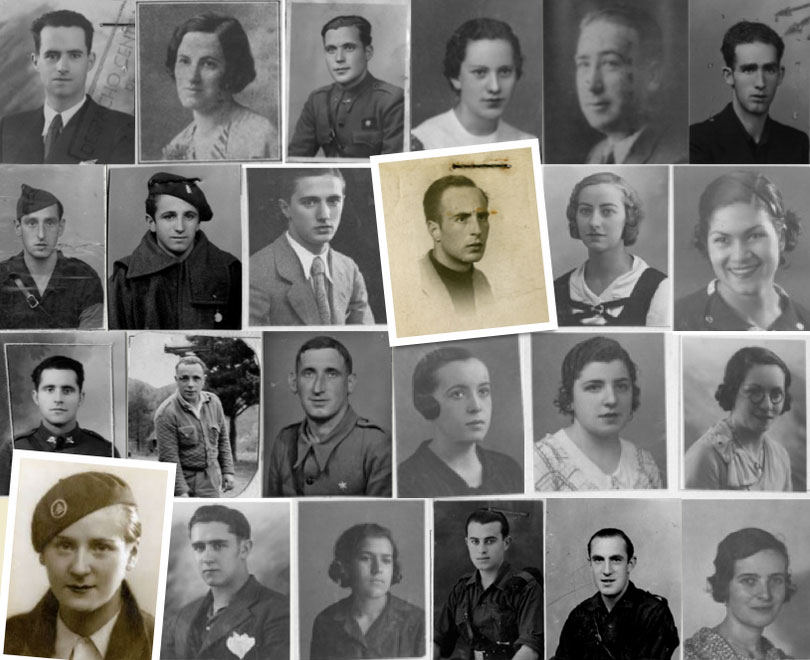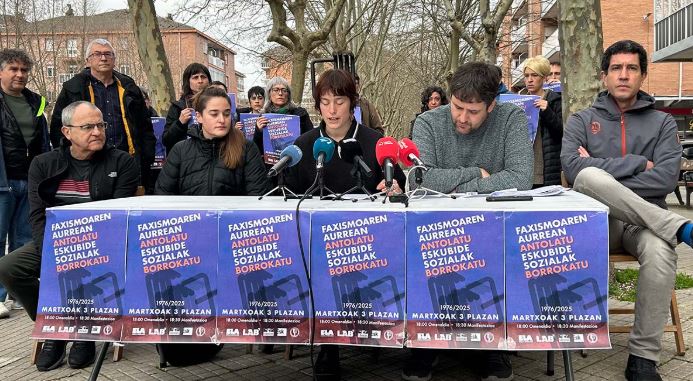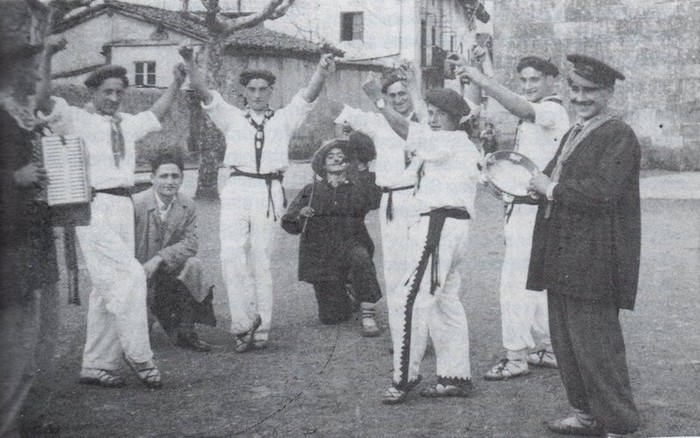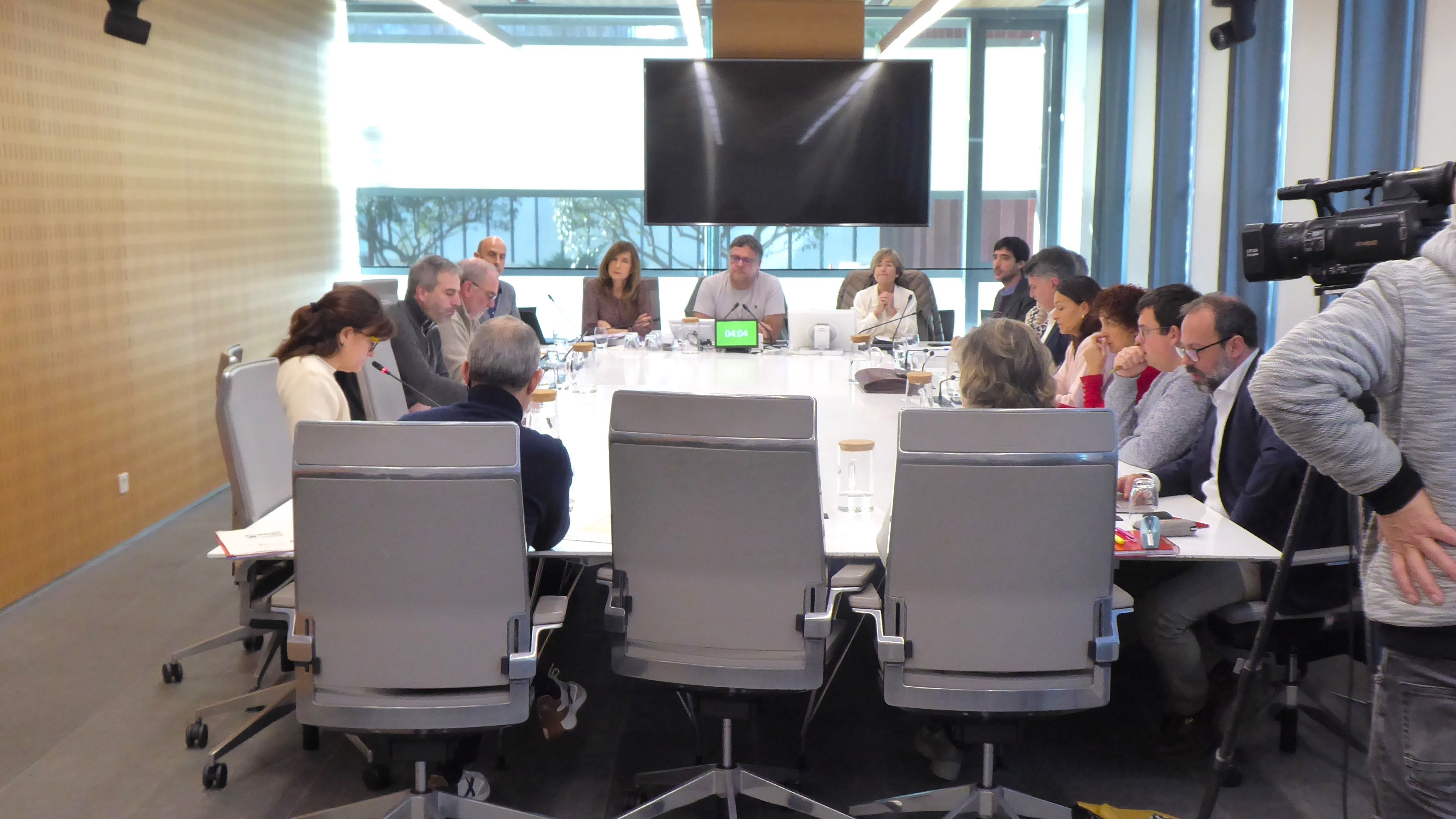"You said three times that I'm red, communist!"
- As soon as you enter the town centre of Irisarri, there, at the door of a house, the ikurrina and the star. You have your residence Jokin Etxebarria. A war kid, lots of walks, and more than eleven tours, from there and here. Because 92 years allow everything you want to live.

Don Jokin Pantxesk Etxebarria. Basauri, 1931
Before us, he asks us, “What day was Passionaria born?” And because we have not known, he answered the question: “December 9. We both were the same day!” The Sabinian name denounces it, and not in vain his father, that of the PNV, was the councillor of Basauri before Franco’s uprising. In his working life he was our accountant Jokin Pantxesca and since then he worked for the sotatars. He lived from Biarritz to Bilbao and from Bilbao to Biarritz, Abertzale, and has known everyone. One of the founders of Seaska and vice-president of the Athletic Club of Biarritz until his death. And among other things, there are countless sauces that cannot be written.
You don't have any name, as I was told: Jokin Pantxesca! It was in the Republic, during the dictatorship of Franco no... but I will always be
Jokin Pantxesca, that is my name. Don Jokin Pantxesk Etxebarria Ugarteburu, Erbitxun. In fact, our parents’ farmhouse in Mungia was a gem and we have always been “Erbitxun”. I, “Jokin Erbi”; my brother, “Iñaki Erbi”… We were three brothers, two boys and Gotzone, the three born in Basauri. His father was from Mungia, his mother from Bilbao, his parents from Markina-Etxebarria.
Since the Spanish Civil War, there is already your “Pantxesca”. They banned their name. Civil War? That was not civil! Throw you out there and here, that war had nothing civil! And what's more, it wasn't a war, it was a military uprising. And so it has to
be said. It was a coup! Then, when I was four years old, my father stayed [month] and my mother stayed with three children. And war! And people started to run away, and so did we. We did it from Basauri to Bilbao, in Calle Marqués del Puerto, 14 [“El casa del indiano”]. There we were. Then, through the Basque Government, we put the children on the train and arrived in Santander. We were in the famous palace of the Magdalene.
Intending to go to Santander where or where... we didn't know where. The boat was from Britain, not from Britain, but from Breton. Coal. And he took us to La
Paliss, to the port. And close to Bordeaux. The first thing was simplification. Then we classify ourselves. No-one's name was useful there. They welcomed us and divided us according to their size: some on one side, others to Belgium, others to Russia or to England… I, for example, was put to Russia, and less badly to Iñaki [brother] did not go to Russia. If he had gone there, he would now be Putin’s minister. Ha...
.jpg)
What happened so that you did not go to Russia? Iñaki was the oldest, ten years older than me, and our mother said, “You take care of Jokintxo, don’t leave a moment alone!” We were at Saint-Jean station in Bordeaux and I got into the Russian train. Iñaki, for her part, walked the train looking for me until she saw me. So he took me and pulled me out of the train. What did I have to do alone? I was five years old!
Then they took us to Baiona and from there to Donibane Garazi, to Ziutadela. We were hundreds of children, from Meñaka, from Jatabe, from Gatika… And we take care, my aunt’s Shell! [Etxebarria Oleaga] Thank you to him.
You have the direct news of Ziutadela, at Donibane Garazi. Yes. I don't know how long I was going to be there. I was
a kid and I didn't know the days or the calendars. But I remember meeting Mr. Fortunato [Unzueta], head of the parish of Begoña in Bilbao. She was also fleeing. Then I had an accident at Donibane Garazi, hitting me on a big gate and breaking my teeth. I went to the hospital and there I was accompanied by a guy from Markina. He was a unique and famous son among us for his great ability to catch flies. When we didn't like what we were fed at lunchtime, we flushed down the toilet when caregivers weren't watching. For example, I didn't like rice, but Iñaki was forcefully eating and I was angry.
“I was 5 years old and I was put on the train for Russia. My brother Iñaki traveled by train until I looked for myself, saw me and pulled me out” in
BORDEAUX, 1937
Iñaki was with you. And your sister, Gotzone? All three of us were at Donibane Garazi.
Iñaki was always with me, but soon he took to work at Gotzone Biarritz. And I told her, aunt was with us. But there I have to quote my mother. My mother was a wise, mythologist and was exiled in Normandy. Then, after my accident, they took me to Ilbarritz,
on
the border of Biarritz. There was a large casino hotel in Stavinsky [La Roseraie]. (…) At the most temporary, we came to Mungia, home to my parents. But to come here, all the children put us in the middle of the bridge [Santiago]. I would be six to seven years old. The Consul of Spain told Iñaki that we would be separated by the two: 18-year-old boys and girls on the one hand and minors on the other. Iñaki had just turned 18, but the consul told Iñaki, “Don’t move, always with your brother!” And when it came to separating 18 years, Iñaki was present! But before Mungia, we also help the Resistance.
During World War II, all refugees entered the Getaria casino. Once the French police came to see the
men and take them to the Belgian border to prevent German progress. It was forbidden to leave there, but I was the child, and I would go from here and now playing. In the village there was a family that had a pastry shop in the plaza and they said, “Go to that place and please say that the gendarmites are in the casino arresting all the men to take it to the front.” I was a rugby ball!
Rugby ball Yes,
I was used by both. He was the “son of Juanita” for all and served me for many things.
Apparently, until they came home. But we didn't go back to Basauri because there was nobody there. I say that my father was laid, died suddenly on 10 October 1936. Mungia's doctor had his cousin, Goiarrola Etxebarria, but during the war he could not go to serve our father. The father died with our mother. His mother also made Santander to La Paliss. The people in the refugee aid groups were on the left. He had his mother in a center of these characteristics and once made a comment
about something. Our culturally rich mother took her in command or next to the center and took her to Normandy, a town in the department of Orne, far from Paris. Then Gotzone was also there, his mother.
Ama and Gotzone, in Normandy, you two brothers in Iparralde… Yes. You had to meet Gotzone! What he ate in Normandy did not like much, and he sang “... those of Santurce, we have to eat ...”, which had sardines to eat, and applauded people. Funny, Gotzone. And how much did he work later? Dressing up as a
nurse, with the red cross, and how many people helped him escape from Bilbao airport! Our love always said, “Sow to add!”
You've ever said you came back to Mungia.
Iñaki and I did, my parents' house. [1942-o] Domingo Etxebarria was a father, but he was called Txomin-Erbi. Widow. There were two women at home, two sisters, gangs. And when a widow gets married for the second time with one of them. He said that, in time of war, the Falangist troops had to take the pig, the cow and the donkey from the house, and from Mungia to Gatika, for having the troops behind.
So did she start school in Mungia? No, I started the first school in Getaria and in Biarritz. Then I stayed in Mungia. Once in the church, in a
superior lounge, the Spanish flag appeared cut with scissors. And the president of Spanish Catholic Action suspected Gotzone. He was 17 years old Gotzon, but they made him a war council! The Cantabrian was the leader of the Spanish Catholic Action. Mark the “Spanish” well because it was. “The Cantabrian puri” was small, pure benene!
.jpg)
The historical stories of the child of war have no end… What have you worked on in your
life? Work? I have earned a lot of money, but without working!
Ha!
Smuggler! I knew three languages and walked on both sides of here!
Seriously, Jokin! What have you worked on? In boat
management. Accounting work for sotatars. Our mother worked for them in Biarritz, the first house next to the lighthouse. Will I enter politics?
Enter politics? What do you mean?
Will I talk about politics?
Yes, then! But
I don't write what I'm going to say.
So, tell what you can write… [Deusto. ETA members. Neguri Maritime Club. Weapons. Txomin Iturbe. Smuggling. Otsondo...]
Stop, eh! You cannot write!
We go back to what you can write. How
did Seaska emerge? Iker Gallastegi! It was him! And with him, Miguel Muñoa, I… We also went to Boise!
You are the “Etxebarria” of Piarres Larzabal. In his book Anai Artean (Txalaparta, 1996) reported his trip to Boise. It was early June 1972.
Seaska and Anai Artea, we were the two organizations to meet, because it was the Boise Basque party. Miguel Muñoa and I were on behalf of Seaska, and from Anai Artea, Txillardegi and Anjel Arrangi. But there they opened with us communists. It was something of Donostia Pedro Beitia, of the PNV. To say that someone was a communist at that time was very serious. Joe Eiguren and Julio Bilbao were the only Basques who spoke to us. The others, we didn't say goodbye! On the eve of arrival we played the ball match between Muñoa and I against two there. The environment changed a little, they saw that we weren't that wrong. And the next day, our environment changed more.
“Gabriel was awesome Aresti. When it rained I was dressed in sneakers; when it was sun, with boots!”
Mass! Piarres Larzabal account... Yes. Anjel Arrangi was very religious, I wasn't, but when I lived in Makea, I went to Mass and I knew how to sing songs from the church. And we went to that Boise Mass. It was a Basque Mass. And we sang with others, and then people, "But how
are the communists, who sing church songs?" Then everything changed and they began to say “Come here!” and “Go there!”. But it was late, we went back the next day. We all became friends, but we didn’t bring money… They said three times I’m red!
Red, communist? Yes, three times! First, when we were in Donibane Garazi, in the Txikis, the founder of the French Basque Ball Federation said that all of us in the Citadel were red. Then, when the Germans arrived, the man was divided because he was a collaborator. Then the Germans left France and imprisoned him, because he was a collaborator! They said I'm red for the second time in Boise. Pedro Beitia said we were communists. Thirdly, in Mungia, he was placed on the police file: “No political idea is known to him, but he has
been educated in a red-separatist atmosphere.” What a stumbling block! And take the file and [Bilbao] to the School of Commerce with Gabriel Aresti.
With Gabriel Aresti? Yes. We went from a course. Very friends. We were in school together. Aresti
was awesome. When it rained I came with sneakers, when it was sun with boots. At rest we played football, and with the boots Aresti dominated! Kar-kar… I was also home. For him it was not easy: his parents were Francoists. My mother worked at Bilbao City Hall, my father was monarchic, my brother [Juan María], Falangist. Gabriel, the black sheep in the house!
You've been told three times that you're red. Are
you a communist? Not a communist, I am an independentist! That is what Gotzon was saying. When Agustín Ibarrola left prison, he was welcomed by Gotzon. Ibarrola was the Communist Party, but Gotzone did not. He was an independentist. He said it!
.jpg)
Kirola eta oroimena uztartuko dituzte, bigarrenez, mendi-martxa baten bitartez. Ez da lehiakorra izanen, helburua beste bat delako. La Fuga izeneko mendi martxak 1938ko sarraskia gogorarazi nahi du. Ezkabako gotorlekuan hasi eta Urepelen amaituko da. Maiatzaren 17an eginen dute.
Fusilamenduak, elektrodoak eta poltsa, hobi komunak, kolpismoa, jazarpena, drogak, Galindo, umiliazioak, gerra zikina, Intxaurrondo, narkotrafikoa, estoldak, hizkuntza inposaketa, Altsasu, inpunitatea… Guardia Zibilaren lorratza iluna da Euskal Herrian, baita Espainiako... [+]
Gogora Institutuak 1936ko Gerrako biktimen inguruan egindako txostenean "erreketeak, falangistak, Kondor Legioko hegazkinlari alemaniar naziak eta faxista italiarrak" ageri direla salatu du Intxorta 1937 elkarteak, eta izen horiek kentzeko eskatu du. Maria Jesus San Jose... [+]
Familiak eskatu bezala, aurten Angel oroitzeko ekitaldia lore-eskaintza txiki bat izan da, Martin Azpilikueta kalean oroitarazten duen plakaren ondoan. 21 urte geroago, Angel jada biktima-estatus ofizialarekin gogoratzen dute.
Bilbo Hari Gorria dinamikarekin ekarriko ditu gurera azken 150 urteetako Bilboko efemerideak Etxebarrieta Memoria Elkarteak. Iker Egiraun kideak xehetasunak eskaini dizkigu.
33/2013 Foru Legeari Xedapen gehigarri bat gehitu zaio datozen aldaketak gauzatu ahal izateko, eta horren bidez ahalbidetzen da “erregimen frankistaren garaipenaren gorespenezkoak gertatzen diren zati sinbolikoak erretiratzea eta kupularen barnealdeko margolanak... [+]
1976ko martxoaren 3an, Gasteizen, Poliziak ehunka tiro egin zituen asanbladan bildutako jendetzaren aurka, zabalduz eta erradikalizatuz zihoan greba mugimendua odoletan ito nahian. Bost langile hil zituzten, baina “egun hartan hildakoak gehiago ez izatea ia miraria... [+]
Memoria eta Bizikidetzako, Kanpo Ekintzako eta Euskarako Departamentuko Memoriaren Nafarroako Institutuak "Maistrak eta maisu errepresaliatuak Nafarroan (1936-1976)" hezkuntza-webgunea aurkeztu du.







